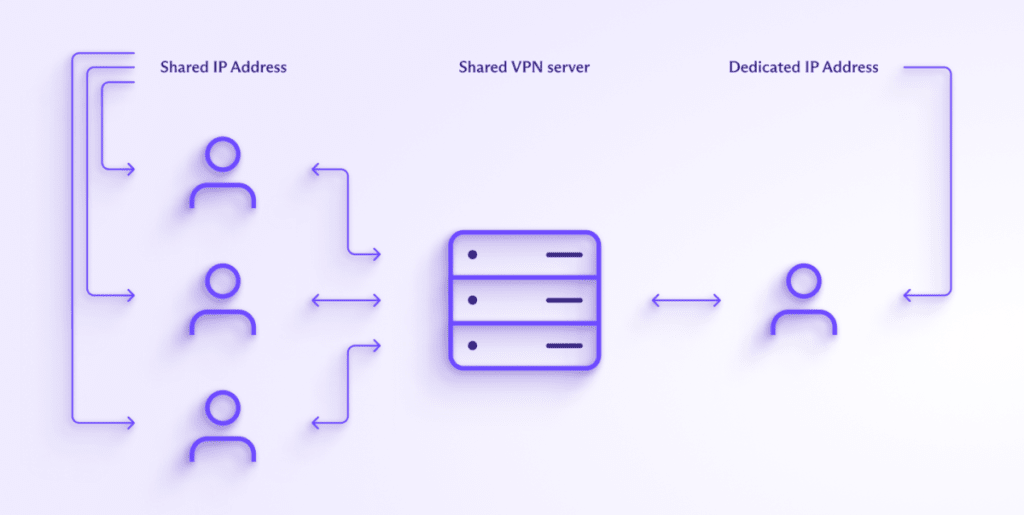These days, virtual private networks (VPNs) are most commonly associated with commercial consumer-facing VPN services, such as Proton VPN, that allow individuals to bypass censorship, access the internet privately, and “spoof” their geographic location.
However, VPNs were originally developed to let remote workers securely access corporate intranets as though they were physically connected to their office’s local area network (nové okno)(LAN).
This setup has become less common as businesses shift to more flexible cloud services and online tools. Instead, business VPNs have evolved into services that offer dedicated IP addresses.
Many businesses also find it very useful to provide individual VPN subscriptions to their staff to ensure they can access the internet privately. In this article, we’ll explore why many businesses use VPNs.
There are basically two ways a business can use a VPN:
These uses are by no means exclusive. Your business can protect staff members’ privacy with bulk VPN subscriptions and provide secure access to company resources via dedicated IPs.
The advantages of bulk VPN subscriptions
Bulk VPN subscriptions for businesses work exactly like the individual VPN plans you can buy from commercial VPN services. This allows staff who are remote, hybrid, or traveling to securely connect to any VPN server located anywhere in the world.

Providing staff with VPN subscriptions gives them all the usual privacy benefits of using a VPN. A VPN’s ability to bypass censorship and access the internet using different countries’ IP addresses can be particularly beneficial in a business context, especially if you have an office or staff in a country that restricts internet access.
Bypass censorship
Staff located in countries that restrict internet access can use a VPN to access the free and open internet. This is useful because it allows employees to bypass biased local narratives and understand how situations are viewed by the international community.
In places such as China, Russia, Belarus, access to external news sources such as the New York Times or The Guardian is blocked. This can severely restrict staff in PR or other roles that require access to news sources outside their country to do their jobs properly.
A VPN allows staff to bypass censorship blocks and access news sources as if they were in the news sources’ country of origin.
Bypass geo-restrictions
VPNs allow businesses to overcome geographical restrictions to access region-specific content and services. With a VPN, staff can connect to servers located in different countries, making it appear that they’re accessing the internet from those locations.
This can be useful for market research, competitor analysis, and accessing localized business resources.
The advantages of dedicated IP addresses
A dedicated IP address is an IP address that only your organization can use. This means:
- The IP address will always be available to your business
- You don’t share it with anyone else

Learn more about dedicated IP addresses
Because the IP address belongs exclusively to your business, it offers several important and unique benefits.
Secure remote access to company resources
Dedicated VPN IP addresses allow you to restrict who can access company resources, files, and applications from remote locations. They act as secure gateways so that only authorized personnel you supply with the correct IP address can access your company’s resources.
Whether working from home, traveling, or on-site at a client’s office, your staff can establish a VPN connection to your corporate network, effectively extending your company’s private network to their device.
This enables seamless access to internal systems and promotes productivity without sacrificing security.
Segmented access to company resources
Dedicated IP addresses also give you the flexibility to decide who can access which company resources. Employees and contractors can be given access to different VPN servers that have different IP addresses, allowing you to provide granular access to content and apps based on their roles within your organization.
Improved collaboration
This segmented access to company resources can be used to facilitate secure collaboration between business partners, clients, and remote teams. By setting up one or more dedicated IP addresses, you can grant controlled access to network resources, ensuring secure data sharing and collaboration while maintaining privacy and security standards.
Added protection against cyberattacks
A dedicated IP address adds a layer of defense against denial-of-service (DoS) attacks(nové okno) by obscuring the actual IP addresses of your company’s resources.
Data privacy compliance
Many businesses must protect customer information to comply with data privacy regulations, and the thresholds they have to meet can be affected by their size, industry, and the country (or countries) they operate in. Examples include the General Data Protection Regulation(nové okno) (GDPR) in Europe and the Health Insurance Portability and Accountability Act(nové okno) (HIPAA) in the USA.
Dedicated IPs can assist a business in meeting (or even exceeding) these requirements by securely restricting access to data to those authorized to access it.
Final thoughts
Here are some specific examples of how businesses use VPNs:
- A financial services company that uses a VPN to allow customers to securely access their personal information online.
- A law firm that uses a VPN to allow its lawyers to securely access client files from anywhere in the world.
- A retail company that uses a VPN to allow its employees to access the company’s inventory system from home.
- A marketing company that uses a VPN to localize consumer product research.
Proton for Business(nové okno) plans allow you to protect your staff’s privacy with bulk VPN subscriptions and reserve dedicated IP addresses that you can use as doors to securely access your business’s resources and data.
In addition to the benefits of using a secure no-logs VPN, Proton for Business plans provide your company access to Proton Mail(nové okno), our world-famous secure email service, plus end-to-end encrypted cloud storage(nové okno) and calendars(nové okno).







